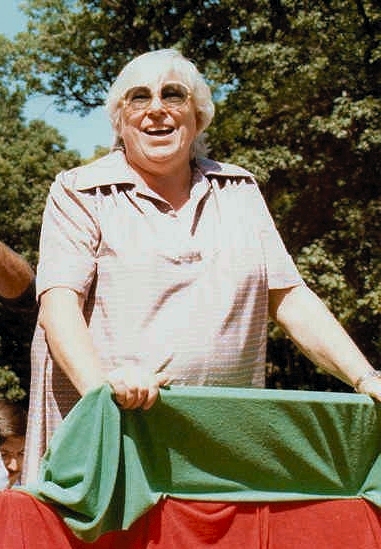Madalyn Murray O’Hair (1919–1995), an atheist, filed several lawsuits that dealt with First Amendment separation of church and state issues. In 1960 she was a plaintiff in a lawsuit, Murray v. Curlett, that sought to prohibit Bible reading in the Baltimore public schools as an unconstitutional activity. The case was consolidated with Abington School District v. Schempp (1963) in which the Supreme Court extended the ban on prayer in public schools established in Engel v. Vitale (1962) to Bible reading and the recitation of the Lord’s Prayer.
O’Hair was born Madalyn Mays in Pittsburgh, Pennsylvania, to a building contractor and homemaker. Her family lost their wealth in the Great Depression. She dated her loss of faith to 1932 when she read the Bible for the first time. During World War II, she enlisted in the Women’s Army Corps and worked as a cryptographer on Gen. Dwight D. Eisenhower’s staff. At the end of the war, she married William J. Murray, whom she later divorced. She earned a bachelor’s of arts degree from Ashland College in Ohio in 1948 and a law degree from South Texas College of Law in 1953. She also studied social work at Howard University in Washington, D.C. and by 1960 was working as a social worker in Baltimore.
O’Hair filed suit over mandatory prayer, Bible reading in Baltimore schools
O’Hair was taking her son William, also an atheist, to enroll in Baltimore schools when she saw students in a classroom reciting the Lord’s Prayer, according to William Murray’s autobiography, “My Life Without God.” When O’Hair pursued the matter, the school board responded that state law mandated prayer or a Bible reading or both at the start of each school day. The attorney general of Maryland issued a finding that school prayer and Bible reading in school were constitutional but that students should be allowed to excuse themselves.
Still dissatisfied, O’Hair, who believed that teachers were discriminating against her son, filed suit in 1960. Superior Court Justice J. Gilbert Prendergast dismissed the lawsuit in 1961 on the grounds that a decision in O’Hair’s favor would force students to submit to her atheist beliefs. O’Hair lost an appeal to the Maryland Court of Appeals before taking the case to the U.S. Supreme Court. The court consolidated the Murray case with a similar challenge from Pennsylvania. In the 8-1 decision Abington decision, the court affirmed in 1963 that public schools must be neutral in matters of religion and that a law requiring school prayer violated the First Amendment.
O’Hair filed lawsuits to remove Christianity from public life
O’Hair, fired from her state job for alleged incompetence, spent much of the next decade filing lawsuits to remove Christianity from public life. She sought to outlaw tax exemptions for churches and clerics as well as tax deductions for donations to churches. She sued to eliminate mandatory periods of silence in schools and to remove the phrase “In God We Trust” from American currency. All of these lawsuits failed.
Although her efforts drew public attention and hate mail, O’Hair appeared to enjoy notoriety and became known for making inflammatory anti-Christian statements. She founded the American Atheist Press in 1965 to publish writings that other publishers would not touch. In 1965 she married artist Richard O’Hair and settled in Austin, Texas.
Her son, William, became a Baptist and after declaring publicly in 1980 that he found atheism to be unfulfilling, he wrote a book describing his mother in unflattering terms. He later wrote a book, “Let Us Pray: A Plea for Prayer for Our Public Schools (1995),” disavowing the famous 1963 Supreme Court decision.
O’Hair was kidnapped and killed
Sometime in 1995, O’Hair, another son, Jon, and granddaughter Robin Murray-O’Hair disappeared. After initially believing that the family might have fled with organization funds, Austin police in 1998 identified three kidnappers, including an employee whom O’Hair had fired for embezzlement. In 2001 the embezzler led police to the remains of the O’Hair family near Austin.
This article was originally published in 2009. Caryn E. Neumann is an Associate Teaching Professor at Miami University of Ohio Regionals. She earned a Ph.D. from The Ohio State University. Neumann is a former editor of the Federal History Journal and has published on Black and women’s history.

